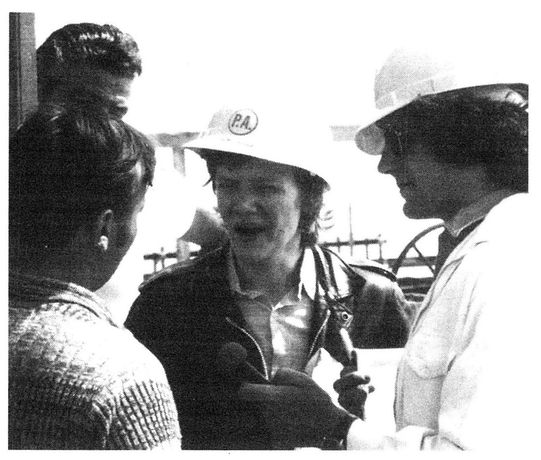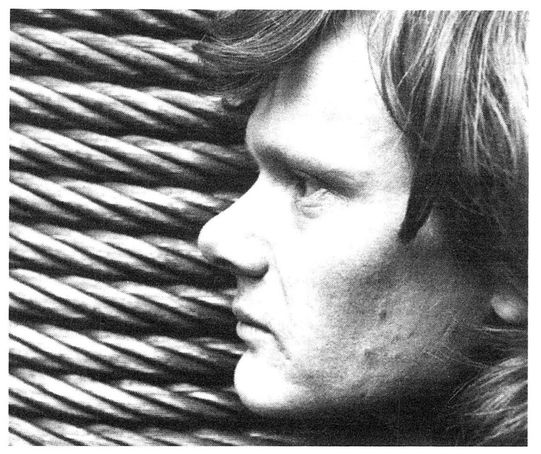To Reach the Clouds (8 page)
Read To Reach the Clouds Online
Authors: Philippe Petit
Being caught up thereâI keep saying “arrested”âslices my dream in two like a saber stroke.
I've crashed back down to earth.
Â
I tell Jim.
I call Jean-Louis, then Annie, then Paul. “
Allo?
We were arrested on the roof. The coup is over!”
Allo?
We were arrested on the roof. The coup is over!”
To dispel the gloom, I force myself to go hunting for a new site.
I drag myself to Times Square, where I look at tiny reproductions of New York landmarks in the tourist shops and scan all the postcards.
I go sightseeing: the George Washington Bridge, Lincoln Center, Rockefeller Center. I even stare at the tall apartment buildings bordering Central Park.
Nothing.
Nothing can replace the twin towers.
Nothing is dominant enough, proud enough, noble enough.
Â
Discouraged, I dedicate myself to a new season of street-juggling.
It doesn't work. I cannot forget WTC.
Â
Three days after my arrest in the sky, I call Annie: “Please, come over quickly!”
With her by my side, I'll suffer the pain of failure less, I'll feel stronger. Who knows, maybe I'll even succeed in relaunching the coup.
I don't tell anyone, but today I feel life is no longer worth living.
The knowledge that Annie is coming fills me with energy.
Mark and I cannot continue to camp out on the floor of Jim's studio. There is barely enough room for his two cats. We go in search of a new home. We answer a couple of classifieds.
I prefer the tiny apartment with only one bedroom and a cramped living room that opens onto a private garden, 12 by 20 feet, where I can practice my juggling. Mark insists on the plush comfort of the old brownstone, very English with its numerous rooms and crystal chandeliers. We introduce ourselves to the tenants, an older couple on their way to Europe. Just as Mark is
about to seal the deal, I inquire innocently, “Excuse me, I forgot to mentionâI am a juggler and I wanted to know if it was all right with you if I move the Chinese vases to the other room when I practice the large balls in the salon. But don't worryâwhen I do the flaming torches, of course I'll roll up the antique Persian rug.”
about to seal the deal, I inquire innocently, “Excuse me, I forgot to mentionâI am a juggler and I wanted to know if it was all right with you if I move the Chinese vases to the other room when I practice the large balls in the salon. But don't worryâwhen I do the flaming torches, of course I'll roll up the antique Persian rug.”
Under Mark's black glance, and to my profound astonishment, we're politely escorted to the door.
Â
At the tiny place with the garden at 422 West 22nd Street, we meet Judy, an attractive young actress on her way to Hollywood.
The place is ours if we will agree to take care of the dog for a few days; after that, a neighbor will come to pick it up. On cue, an immense Irish setter bounds from the bedroom (it must have been hiding under the bed), knocks over a chair, and leaps at Mark's neck in a show of passionate affection.
With a smile of revenge, Mark informs our hostess, “Oh, I should tell you, my friend Philippe here really hates anâ”
“I really hate an ⦠empty apartment,” I cut in, not missing a beat. “I love animals! What's his name?”
“Baron.”
“Baron? What a beautiful name! Baron, come greet your new friend!” And in front of a flabbergasted Mark, I let my face be licked all over by the drooling giant.
I have decided to attempt to pull off an interview with the workers on the top of the towers, using the flimsy letter of introduction from the architectural digest. I make lists of neutral questions, sensitive questions, information to get, photographs not to miss.
I'll play the journalist, Jim will be my photographer, and Mark the recording engineer. Mark calls the WTC's public relations office. We get an appointment, not for the interview, but first to
be interviewed ourselves. That's how it works, for security reasons.
be interviewed ourselves. That's how it works, for security reasons.

Mark and I go to an office on the 68th floor of the north tower. I explain to an affable man with white hair my desire to interview the construction workers toiling on the highest towers in the world, to write an article for a prestigious French architecture magazine.
With a paternalistic smileâthe man must already consider us a pair of amateursâhe tells me, “There's no more construction. The towers are built. All the workers are gone, busy now on a new building.”
I know he is lyingâI've seen plenty of workers during my innumerable clandestine visitsâbut what can I say? I mention that the magazine had me rent a helicopter recently to take aerial shots, and that during the flight, it seemed to meâyes, I'm quite sureâI saw people working on the unfinished roofs of both towers.
The man is surprised by my insistence. He knows that every journalist wants to ask questions of the renowned “sky-framers” who assemble steel at dizzying heights. “They're famous for their absence of vertigo, you know. And those”âhe deliberately slows his delivery, so that this time I may understandâ“those, as I told you earlier, have finished their job, they're gone. For two months already. We've got crews of secondary welders, electricians, plasterers, painters, and so on still on the job, mainly on the upper floors of the south tower, but those are not the people you're interested in.”
I don't give up so easily.
“On the contrary! I'm tired of all those articles about acrobats taking lunch breaks on narrow I-beams, enough of this high-steel stuff! What I want to write about, what my readers want to know is: Who are those secondary workers no one ever talks about? What are their working conditions? How do they feel? Are they proud? Are they afraidâbecause they do have vertigo? We need a story on the humble and obscure people putting the finishing touches on the twin towers!”
Â
The man stares at me quite suspiciously. “You said you had a letter of introduction from that magazine? May I see it?”
I hold out the falsified
Metropolis
document, trying to still the trembling of my hand.
Metropolis
document, trying to still the trembling of my hand.
The man takes the letter, gives us a long appraisal, reads the letter, pauses, looks me and Mark in the eyes, then orders, “Stay there. I'll be right back.”
Mark and I exchange a glance of terror. I turn toward the door. Now's the moment to flee.
But our man soon reappears. “Permission granted. Come back tomorrow.”
The interview goes smoothly.
After talking to a few workers in the upper floors of the south tower, I insist on going to the roof. Our man from the public relations office, trying to be helpful, introduces me to all the contractors and stays close.
By walking around hurriedly, I manage to lose him whenever I need to give discreet directions to Jim or Mark.
“Jim, right there!” I whisper, brushing by him, directing three fingers glued together (so it doesn't look like I am pointing) to an I-beam that interests me.
Jim focuses his camera on a group of workers spreading
cement, but at the instant of clicking the shutter, he turns the camera covertly to the I-beam in question.
cement, but at the instant of clicking the shutter, he turns the camera covertly to the I-beam in question.

“Mark, he's all yours for two minutes!” I murmur, retying my shoelaces.
Mark sticks the too-large microphone of his toylike tape recorderâbought yesterday at Woolworthâunder the nose of our host and asks, in a reporter's obnoxious I-have-a-right-to-know tone, for some clarifications on trivial points. The man frowns at the instrument, probably thinking, “These French journalists are so cheap,” but he responds with lengthy explanations, during which I speed unimpeded to an area I need to inspect.
Â
When the spokesman is not too close, I start bits of conversation with the workers. Under cover of my less-than-fluent English, I succeed in gleaning information about their work schedules, locker room locations, entry routes, security conditions, and
countless other details relevant to the coup. I also learn the correct terms for the different features of the roof.
countless other details relevant to the coup. I also learn the correct terms for the different features of the roof.
Our guide is obviously intrigued by the constant dispersal and regrouping of this weird trio of journalists and their unusual style of questioning. Naturally, he focuses on me. He seems impressed by my perfect knowledge of the towers, but he's a bit mystified.
I'm pleased at his consternation when I address several workers in their native tongues, conversing in turn in French, Russian, German, and Spanish.
But when I ask a passing architect if I can take a look at his blueprints, and inquire whether he knows why the towers are not true twins, why they're of different heights, the PR man orders, “Stop the tape recorder! Who gave you that information? No one knows that besides a couple of engineers.”
Keeping my cool, I crouch and point at the other roof, squinting. “Well, it's obvious! No?”
The spokesman, in a sweat, crouches and squints his eyes. Now he is confused! Mark and Jim turn quickly to conceal their silent laughter.
Â
Back on the ground, Jim rushes his film to the lab, Mark busies himself transcribing his tapes, and I, all smiles, put my notes and sketches in order.
The success of this first “official” intrusion seems to bring the coup closer to â¦
To reality?
I am encouraged.
Encouraged enough to resume looking for the equipment still lacking.
Â
Not far from the island of Manhattan, I discover a cable factory, or rather a cable factory's warehouse and workshop.

Finding myself surrounded by hundreds of coils of steel wire-rope of different constructions and diameters; lifting enormous U- or Lyra-shackles one after another off the greasy concrete floor; caressing the grain left by the foundry on heavy-duty thimbles; comparing the design of cable clamps that jingle when I pick them up and put them back; and chatting under dim lights with men who have dedicated their lives to handling the unforgiving steel, who have black grease forever imprinted on their skinâand who love itâall this rekindles from embers to living flames my determination to fight for my mad project.
Â
Thus, like the pair of impassable towering shadows that peacefully stretch every evening above the rooftops of the voracious metropolis as if to invade it, as if to force it to surrender, as if to suffocate it; like these two silvery pylons whose summits deface the clouds, and between which the sun must sneak in order to chase out the last of the night; similarly, inexorably, my insane
dream of the twin towers has once again infiltrated my veins, has once again become essential to my existence.
dream of the twin towers has once again infiltrated my veins, has once again become essential to my existence.
Silent emptiness prolongs this thought.
Other books
3.5. Black Magic Woman by John G. Hartness
Dragonlance 04 - Time of the Twins by Margaret Weis, Margaret Weis
Between Giants by Prit Buttar
Highpockets by John R. Tunis
Shades of Surrender by Lynne Gentry
Moonlighting in Vermont by George, Kate
Fat Tuesday Fricassee by J. J. Cook
The Blue Rose by Anthony Eglin
Dark Descent (Vampire Hunter Book 5) by Reynolds, S.C.
Caught (Men of the Show Book 3) by Rhonda Shaw